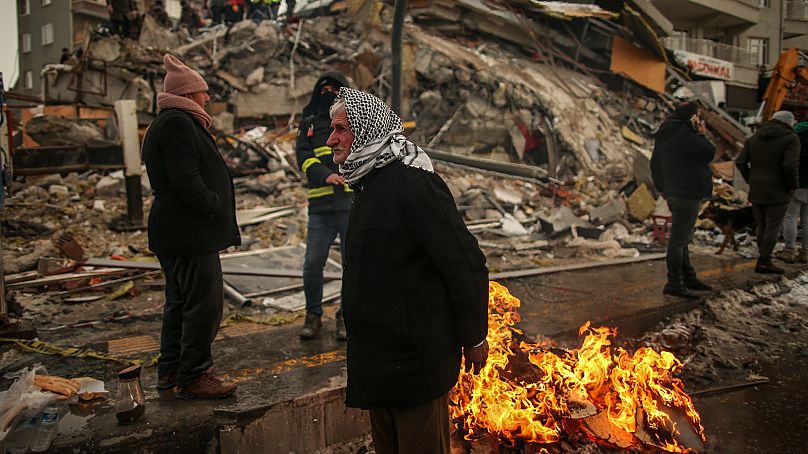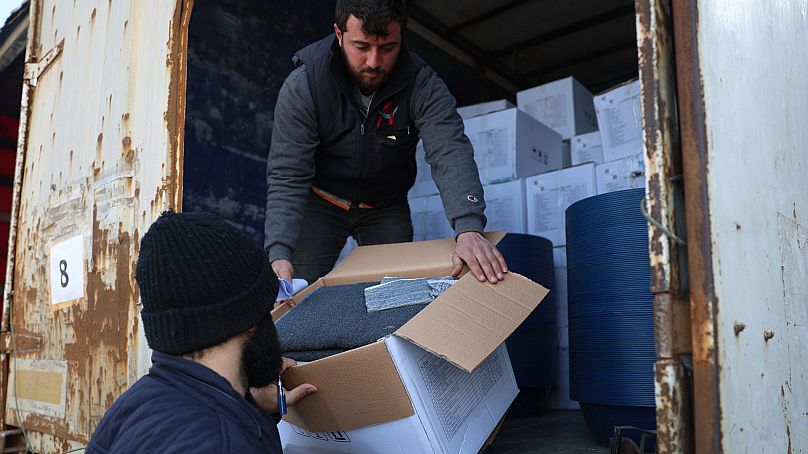Some NGOs working in Syria believe that they are ready to help earthquake workers. The only thing that’s missing is the funds.
"We have raised tens of millions of dollars, but it's not enough," Red Cross spokeswoman Susan Malandrino told Euronews, as entire cities have been completely destroyed in the devastating earthquakes that hit Turkey and Syria over a month ago.
"You have robust, vibrant communities that really are starting anew," she said. "So the needs are absolutely great. And we encourage donors to give to the charity of their choice [...] to support the really urgent needs. And with those donations, we can really pivot to what the challenges are at the moment. As the crisis evolves, as we're looking for long-term planning, we want to be flexible and really meet the needs as they rise.”
Food and water were just some of the urgent necessities that entire communities now need. To help people, she said, the Red Cross is going to revive a cash-distribution program.
In the past, the project provided help for Syrian refugees, so they could buy their own food, hygiene products and necessities at the market.
Help is on the way?
International funding is drastically needed to help victims in disaster zone. On Tuesday, the European Union discussed providing financial help for earthquake victims at an international donor conference in Brussels.
The head of the European Commission, Ursula von der Leyen, called for a return to the solidarity seen in the first hours after the tremors hit.
In Turkey alone, damage from the catastrophe could exceed $100 billion [€93 billion], according to the United Nations Development Programme.
Different estimations proposed by international and Turkish institutions include the immediate damage caused by the earthquakes and the delayed effects on the economy, according to Arda Tunca, a Turkish economist and “Politikyol” columnist.
"About 15% of Turkey's population used to live in the areas hit by the earthquake and these areas represent about 10% of Turkey's annual GDP," he said. "So the effect on the growth is going to be up to 2%, less than two percentage points less than what we normally would expect by the end of 2023.”
According to Tunca, the direct damage from the earthquake alone is around $35 billion [€32 billion]. If we take into account the indirect effects, that figure jumps to between $75- 80 billion [€70-74 billion].
He added that Turkey was experiencing a severe crisis before the natural disaster. He speculated that the country’s future depends less on money and more on reforms - both in the political and legal spheres. And this will cause the government serious headaches after the elections, regardless of whether the incumbent President Recep Tayyip Erdoğan or the opposition wins.
Earthquake in a war-torn country
Since the earthquakes, the situation has been particularly difficult in northern Syria. Towns that had already been damaged during the 12 years of war were again devastated. "It was always going to be much more difficult logistically, politically, and also in terms of the preparedness in the country," Ahmed Bayram of the Norwegian Refugee Council told Euronews.
In addition to the lack of water and food, Bayram argued there is also a problem with shelter. Over 100,000 people have been displaced. Many are now housed in mosques and schools. Some people have been forced to sleep on mattresses in overcrowded rooms that used to serve as classrooms. And sometimes they have to take turns sleeping.
The Norwegian Refugee Council believes that the upcoming donor conference in Brussels will be a sort of test for Europe.
So far, Bayram argued, NGOs working in Syria have received less than a third of the funds that the UN estimates are needed to help earthquake victims.
But he argued organizations on the ground are ready to do everything that is necessary, including reconstructing destroyed infrastructure. The only thing that’s missing is the resources.













